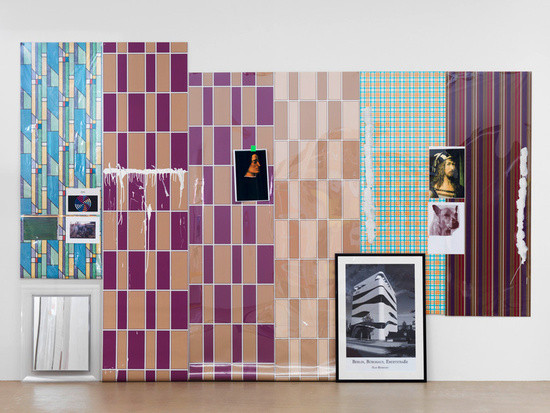Isa Genzken
15 Nov 2012 - 12 Jan 2013

© Isa Genzken
Untitled, 2010—2012
Wrapping and wall paper, perspex, tape, paint, prints, mirror, frame
275.4 x 418.5 x 12 cm / 108 3/8 x 164 3/4 x 4 3/4 in
Untitled, 2010—2012
Wrapping and wall paper, perspex, tape, paint, prints, mirror, frame
275.4 x 418.5 x 12 cm / 108 3/8 x 164 3/4 x 4 3/4 in
ISA GENZKEN
15 November 2012 – 12 January 2013
‘I have always said that with any sculpture you have to be able to say, although this is not a ready-made, it could be one. That’s what a sculpture has to look like. It must have a certain relation to reality’
– Isa Genzken in conversation with Wolfgang Tillmans
Inspired by the stark severity of modernist architecture and the chaotic energy of the city, just as much as by art history, the aesthetics of the great American artists of the Sixties and pop culture, Isa Genzken’s work is continuously looking around itself, translating into three-dimensional form the way that art, architecture, design and media affects the experience of urban life. From 15 November, Genzken will present an exhibition of new and recent works at Hauser & Wirth’s Savile Row gallery. Genzken’s totemic columns, pedestal works and collages combine disparate aspects from her many sources in seemingly nonsensical, yet harmonious sculptural compilations.
The bust of Nefertiti, an ancient icon of feminine beauty, is one of the most well-known and historically significant sculptures. In Genzken’s new series of sculptures, she appropriates plaster reproductions of this bust, which the artist first saw at the Egyptian Museum in Berlin, gives them sunglasses and places them upon tall, white pedestals. She pairs Nefertiti with a reproduction of the Renaissance icon of feminine beauty, the Mona Lisa, whose famous portrait leans against the foot of each pedestal. Genzken then overlays her own self-portrait on to the reproduction of Mona Lisa, playfully inserting herself and her own practice into this multimedia exploration of the lineage of feminine beauty and the place of women in art history.
Genzken’s sculptures are precariously stacked assemblages of potted plants, designer furniture, empty shipping crates and photographs, among other things, arranged with the traditions of modernist sculpture in mind – traditions which are then manipulated by the artist. With this cacophonous array of objects, Genzken undermines the classical notions of sculpture and, in the North Gallery of Savile Row, re-creates the architectural dimensions of the artist’s beloved skyscrapers and the riotous colours of the city streets. Devoid of the weightiness and overpowering scale seen in the sculptures of her Minimalist predecessors, these works abandon notions of order and power, allowing the viewer to relate to the works’ inherently human qualities of fragility and vulnerability.
Both sculpture and photography combine and overlap in Genzken’s collages, whose dense surfaces are formed from the materials of the artist’s world: magazines, flyers, snapshots of friends, self-portraits and reproduced artworks. Genzken makes use of all surfaces of the gallery, including an on-going series of collages that span the floor of the space, like a pavement down a busy city street.
15 November 2012 – 12 January 2013
‘I have always said that with any sculpture you have to be able to say, although this is not a ready-made, it could be one. That’s what a sculpture has to look like. It must have a certain relation to reality’
– Isa Genzken in conversation with Wolfgang Tillmans
Inspired by the stark severity of modernist architecture and the chaotic energy of the city, just as much as by art history, the aesthetics of the great American artists of the Sixties and pop culture, Isa Genzken’s work is continuously looking around itself, translating into three-dimensional form the way that art, architecture, design and media affects the experience of urban life. From 15 November, Genzken will present an exhibition of new and recent works at Hauser & Wirth’s Savile Row gallery. Genzken’s totemic columns, pedestal works and collages combine disparate aspects from her many sources in seemingly nonsensical, yet harmonious sculptural compilations.
The bust of Nefertiti, an ancient icon of feminine beauty, is one of the most well-known and historically significant sculptures. In Genzken’s new series of sculptures, she appropriates plaster reproductions of this bust, which the artist first saw at the Egyptian Museum in Berlin, gives them sunglasses and places them upon tall, white pedestals. She pairs Nefertiti with a reproduction of the Renaissance icon of feminine beauty, the Mona Lisa, whose famous portrait leans against the foot of each pedestal. Genzken then overlays her own self-portrait on to the reproduction of Mona Lisa, playfully inserting herself and her own practice into this multimedia exploration of the lineage of feminine beauty and the place of women in art history.
Genzken’s sculptures are precariously stacked assemblages of potted plants, designer furniture, empty shipping crates and photographs, among other things, arranged with the traditions of modernist sculpture in mind – traditions which are then manipulated by the artist. With this cacophonous array of objects, Genzken undermines the classical notions of sculpture and, in the North Gallery of Savile Row, re-creates the architectural dimensions of the artist’s beloved skyscrapers and the riotous colours of the city streets. Devoid of the weightiness and overpowering scale seen in the sculptures of her Minimalist predecessors, these works abandon notions of order and power, allowing the viewer to relate to the works’ inherently human qualities of fragility and vulnerability.
Both sculpture and photography combine and overlap in Genzken’s collages, whose dense surfaces are formed from the materials of the artist’s world: magazines, flyers, snapshots of friends, self-portraits and reproduced artworks. Genzken makes use of all surfaces of the gallery, including an on-going series of collages that span the floor of the space, like a pavement down a busy city street.
